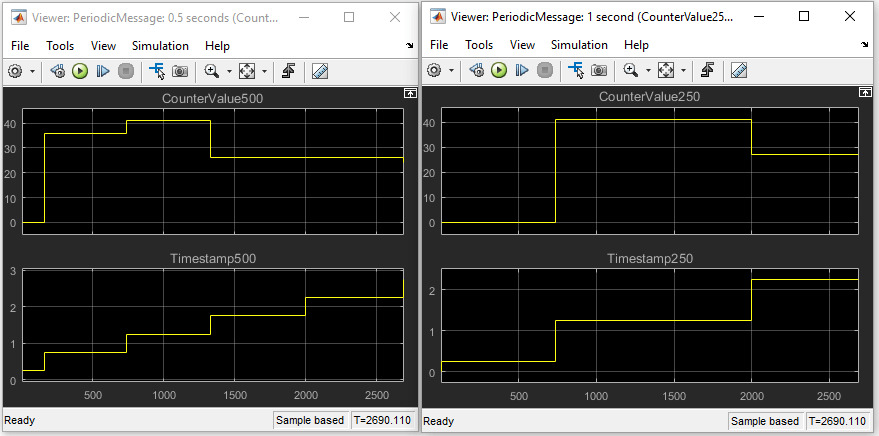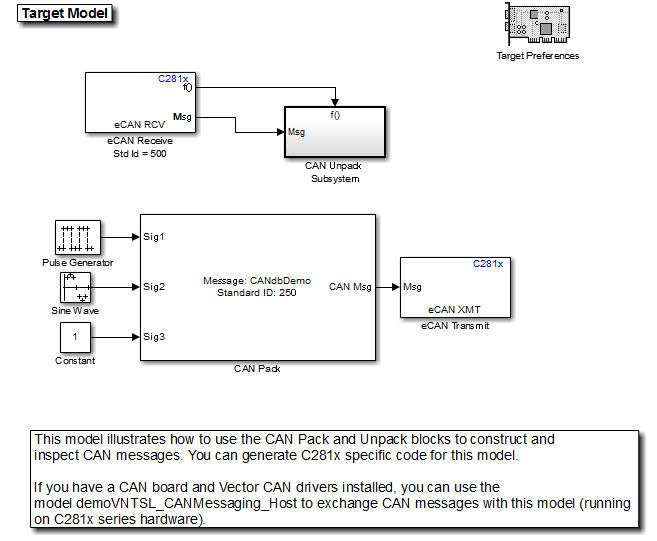CAN Transmit
将 CAN 报文传输到所选 CAN 设备
库:
Vehicle Network Toolbox /
CAN Communication
描述
CAN Transmit 模块使用指定的 CAN 设备将报文传输到 CAN 网络。CAN Transmit 模块可以在给定时间步内传输单个报文或报文数组。要传输报文数组,请使用 Simulink® 模块库中的 mux (Simulink)(多路复用)模块。
注意
您需要 Vehicle Network Toolbox™ 和 Simulink 软件的许可证才能使用此模块。
CAN Transmit 模块有一个输入端口。此端口接受使用 CAN Pack 模块打包的 CAN 报文。它没有输出端口。
CAN 是 P2P 网络,因此在物理总线上发送报文时,必须至少存在一个其他节点,才能正确地确认报文。如果没有其他节点,传输会被视为错误帧而失败,随后设备将不断重试传输。
其他支持的功能
CAN Transmit 模块支持使用 Simulink 加速模式。使用此功能,可以加快 Simulink 模型的执行速度。有关此功能的详细信息,请参阅加速 (Simulink)。
CAN Transmit 模块支持使用代码生成和 packNGo 函数将所需的源代码和依赖共享库打包。
代码生成
Vehicle Network Toolbox 提供的 Simulink 模块支持您生成代码,使包含这些模块的模型可在加速、快速加速、外部和已部署模式下运行。
您可以将 Vehicle Network Toolbox、Simulink Coder™ 和 Embedded Coder® 软件结合使用,以在您用来实现模型的主机端生成代码。有关代码生成的详细信息,请参阅生成代码编译 (Simulink Coder)。
这些模块生成的代码可移植性有限。它使用预编译的共享库(如 DLL)来支持特定类型设备的 I/O。使用此模块,您可以使用 Simulink Coder 支持的 packNGo 函数来设置和管理模型的编译信息。packNGo (Simulink Coder) 函数允许您将模型代码和依赖共享库打包到一个 zip 文件中进行部署。您不需要在目标系统上安装 MATLAB®,但需要 MATLAB 支持目标系统。
要设置 packNGo,请执行以下代码:
set_param(gcs,'PostCodeGenCommand','packNGo(buildInfo)');
在此示例中,gcs 是您要编译的当前模型。编译模型会创建一个与模型同名的 zip 文件。您可以将此 zip 文件移至另一台机器,并在该机器中编译 zip 文件中的源代码以创建可独立于 MATLAB 和 Simulink 运行的可执行文件。生成的代码使用 C 和 C++ 编译器进行编译。有关详细信息,请参阅代码编译自定义 (Simulink Coder)。
注意
在 Linux® 平台上,您需要将用于解压缩库的文件夹添加到环境变量 LD_LIBRARY_PATH。
示例
端口
输入
参数
扩展功能
版本历史记录
在 R2009a 中推出



